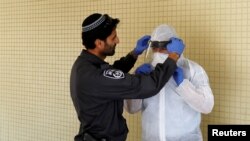Israel has issued new restrictions to fight the coronavirus, basically putting the entire country under quarantine, except for grocery shopping and medical care. Public transport is being curtailed, as well.
Israel also is opening special drive-through testing stations to find more people infected with the respiratory ailment, as health officials worry it is spreading fast. To help deal with the crisis, the country also called up 2,500 reservists.
Except for urgent medical care and to restock supplies, Israelis are being told to stay at home, and avoid parks, beaches, and even open spaces. The restrictions come after some Israelis went to the beach, taking advantage of a warm spring day and the closure of many schools and offices. Under the new rules, people are being allowed out to walk their dogs or to take short walks in the fresh air. The measures, however, have sparked another round of panic shopping, as many people fear that supermarkets will close, despite government assurances.
Manfred Green, from the school of public health at the University of Haifa, said the virus is spreading quickly.
“According to what we’ve seen elsewhere, and according to what we understand about the infectivity of this virus, it’s likely that it’s going to spread very widely everywhere. And it’s just a matter of time. So basically, we are doing everything to try and slow down the spread. We don’t really believe we can stop it, because it’s a very infectious disease,” said Green.
Israel has more than 320 confirmed cases, but health officials say thousands likely have been infected. Israel’s Magen David Adom emergency service said that starting Wednesday, it will open drive-through testing stations in the country’s large cities to enable hundreds of tests to be conducted each day.
Prime Minister Benjamin Netanyahu recently announced that Israel’s Shin Bet security service will begin using cybertools to track coronavirus patients and warn anyone who has been in contact with them. The tools are also being used to enforce home quarantine.
Tehila Shwartz Altshuler of the Israel Democracy Institute says she is concerned about these new tools.
"What Netanyahu announced tonight in Israel is very, very uncommon. It is using extreme authorities and extreme tools which were granted to secret services in order to fight terror now in order to fight a civil problem, or the pandemic. I don’t think this is appropriate,” Shwartz Altshuler said.
Amid the new crisis, Israel still has no government, more than two weeks after an election — its third this year. Former Army Chief of Staff Benny Gantz is trying to put together a unity government with Netanyahu. Gantz already tried to do the same following the previous election but was not successful.




